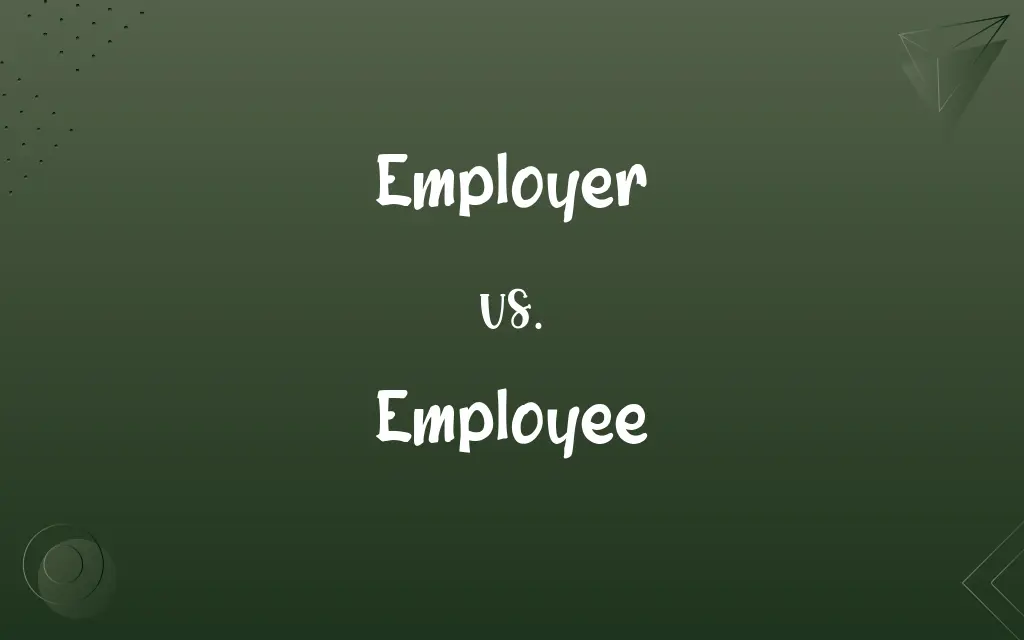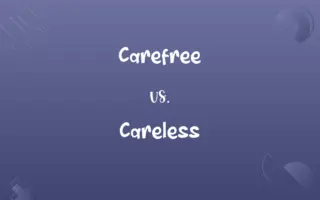Employer vs. Employee: Know the Difference

By Shumaila Saeed || Updated on December 25, 2023
An employer is an individual or organization that hires and pays employees for their work; an employee is a person hired and paid by an employer to perform specific duties.

Key Differences
An employer is a person or entity that hires individuals to perform specific tasks or services. They have the authority to control the work environment and dictate the terms of employment. On the other hand, an employee is someone who is hired by the employer to perform these tasks. They follow the employer’s guidelines and receive compensation for their work.
Shumaila Saeed
Dec 06, 2023
In the relationship dynamic, the employer holds a position of power, as they make decisions about hiring, pay, and job responsibilities. Employees, conversely, have less control but are protected by labor laws that ensure fair treatment and compensation. The employer is responsible for creating a conducive work environment, while the employee is expected to fulfill their job duties.
Shumaila Saeed
Dec 06, 2023
From a financial perspective, employers bear the cost of salaries, benefits, and training for their employees. Employees, in return, contribute their skills and labor to help achieve the employer’s business goals. This financial exchange underpins the employer-employee relationship, with both parties aiming for a mutually beneficial arrangement.
Shumaila Saeed
Dec 06, 2023
In terms of legal obligations, employers must adhere to various laws regarding employee rights, workplace safety, and discrimination. Employees, meanwhile, are obligated to perform their duties to the best of their ability and in compliance with company policies and legal regulations. This legal framework governs the conduct and responsibilities of both parties.
Shumaila Saeed
Dec 06, 2023
In summary, while employers and employees have distinct roles, their relationship is interdependent. Employers provide opportunities and resources, and in return, employees contribute their time and expertise. This symbiotic relationship is fundamental to the functioning of businesses and organizations.
Shumaila Saeed
Dec 06, 2023
ADVERTISEMENT
Comparison Chart
Definition
An individual or entity that hires and pays for services rendered by employees.
A person who is hired and paid by an employer to perform specific duties.
Shumaila Saeed
Dec 06, 2023
Position in Relationship
Holds authority and makes decisions about hiring, pay, and work conditions.
Subject to the employer's authority, follows directives, and performs tasks as required.
Shumaila Saeed
Dec 06, 2023
Financial Responsibility
Responsible for paying salaries, benefits, and possibly providing training.
Receives compensation for their work, including salary and any benefits as per agreement.
Shumaila Saeed
Dec 06, 2023
Legal Obligations
Must comply with labor laws, provide a safe work environment, and avoid discrimination.
Expected to perform duties as per contract and adhere to legal and company policies.
Shumaila Saeed
Dec 06, 2023
Role in Business
Sets business goals, provides resources, and manages employees to achieve objectives.
Contributes skills and labor towards achieving the employer's business goals.
Shumaila Saeed
Dec 06, 2023
ADVERTISEMENT
Employer and Employee Definitions
Employer
A person or group that controls the work environment and job conditions.
The employer implemented new policies to improve workplace safety.
Shumaila Saeed
Dec 06, 2023
Employee
An individual hired by an employer to perform specific duties.
The employee received recognition for her exceptional contributions to the project.
Shumaila Saeed
Dec 06, 2023
Employer
The party in an employment contract that offers remuneration for services.
Her employer agreed to a flexible working schedule to accommodate her needs.
Shumaila Saeed
Dec 06, 2023
Employee
A person who works for a company or individual in exchange for wages.
As a new employee, he was eager to demonstrate his skills.
Shumaila Saeed
Dec 06, 2023
Employer
An employer is an organization or individual that hires and pays individuals for work.
The employer offered competitive salaries to attract skilled workers.
Shumaila Saeed
Dec 06, 2023
ADVERTISEMENT
Employee
Someone who contributes their skills and labor to an employer's business goals.
The employee consistently exceeded her sales targets, benefiting the company.
Shumaila Saeed
Dec 06, 2023
Employer
A business or individual providing employment to others in exchange for labor.
The local business became the largest employer in the community.
Shumaila Saeed
Dec 06, 2023
Employee
A person employed to perform tasks set by an employer.
The employee adapted quickly to the new software used in the office.
Shumaila Saeed
Dec 06, 2023
Employer
An entity responsible for providing job opportunities and overseeing employees.
As an employer, the company focused on employee development and satisfaction.
Shumaila Saeed
Dec 06, 2023
Employee
A worker under contract with an employer for services rendered.
The company's success depended on the dedication of its employees.
Shumaila Saeed
Dec 06, 2023
Employer
To provide work to (someone) for pay
Agreed to employ the job applicant.
Shumaila Saeed
Oct 19, 2023
Employee
A person who works for another in return for financial or other compensation.
Shumaila Saeed
Oct 19, 2023
Employer
To engage the attention or activity of; occupy
Employed himself for an hour reading blogs.
Shumaila Saeed
Oct 19, 2023
Employee
An individual who provides labor to a company or another person.
One way to encourage your employees to work harder is by giving them incentives.
Shumaila Saeed
Oct 19, 2023
Employer
To put (something) to use or service
Employed a pen to open the package.
Employed her skills in the new job.
Shumaila Saeed
Oct 19, 2023
Employer
To devote (time, for example) to an activity or purpose
Employed several months in learning Swahili.
Shumaila Saeed
Oct 19, 2023
Employer
A person, firm or other entity which pays for or hires the services of another person.
Shumaila Saeed
Oct 19, 2023
Repeatedly Asked Queries
What are the key duties of an employee?
Performing tasks as per the employment contract and following company policies.
Shumaila Saeed
Dec 06, 2023
What are the main responsibilities of an employer?
Paying wages, providing a safe work environment, and adhering to labor laws.
Shumaila Saeed
Dec 06, 2023
What is an employer?
An entity or individual that hires and pays people to perform work.
Shumaila Saeed
Dec 06, 2023
Can an employer also be an employee?
Yes, if they work for another entity while employing others.
Shumaila Saeed
Dec 06, 2023
How does an employer benefit from hiring employees?
By gaining the labor and skills necessary to achieve business goals.
Shumaila Saeed
Dec 06, 2023
What legal protections do employees have?
Rights to fair pay, safe working conditions, and freedom from discrimination.
Shumaila Saeed
Dec 06, 2023
What is an employee?
A person hired by an employer to perform specific tasks.
Shumaila Saeed
Dec 06, 2023
Can an employer terminate an employee without cause?
This depends on the labor laws and the terms of the employment contract.
Shumaila Saeed
Dec 06, 2023
What are common issues employers face with employees?
Challenges include managing performance, retention, and conflict resolution.
Shumaila Saeed
Dec 06, 2023
What is the role of an employer in employee development?
Providing training, opportunities for growth, and constructive feedback.
Shumaila Saeed
Dec 06, 2023
What defines a good employer?
Fair treatment of employees, good communication, and providing benefits.
Shumaila Saeed
Dec 06, 2023
What traits make a good employee?
Reliability, skill proficiency, and a positive attitude towards work.
Shumaila Saeed
Dec 06, 2023
Can an employer change an employee's job role?
Yes, but typically within the scope of the employment contract or agreement.
Shumaila Saeed
Dec 06, 2023
What is the impact of poor employer-employee relations?
It can lead to low morale, decreased productivity, and high turnover.
Shumaila Saeed
Dec 06, 2023
How does an employee benefit from their work?
Through receiving compensation, gaining experience, and career development.
Shumaila Saeed
Dec 06, 2023
How can an employee advance in their career?
Through skill development, networking, and achieving measurable success.
Shumaila Saeed
Dec 06, 2023
Can an employee negotiate terms with their employer?
Yes, particularly during the hiring process and performance reviews.
Shumaila Saeed
Dec 06, 2023
What are common challenges for employees in the workplace?
Balancing work-life, dealing with workplace stress, and career advancement.
Shumaila Saeed
Dec 06, 2023
Are employers responsible for employee training?
Generally, yes, especially for skills necessary for the employee’s role.
Shumaila Saeed
Dec 06, 2023
How important is the employer-employee relationship?
It's crucial for business success, employee satisfaction, and productivity.
Shumaila Saeed
Dec 06, 2023
Share this page
Link for your blog / website
HTML
Link to share via messenger
About Author
Written by
Shumaila SaeedShumaila Saeed, an expert content creator with 6 years of experience, specializes in distilling complex topics into easily digestible comparisons, shining a light on the nuances that both inform and educate readers with clarity and accuracy.








































































